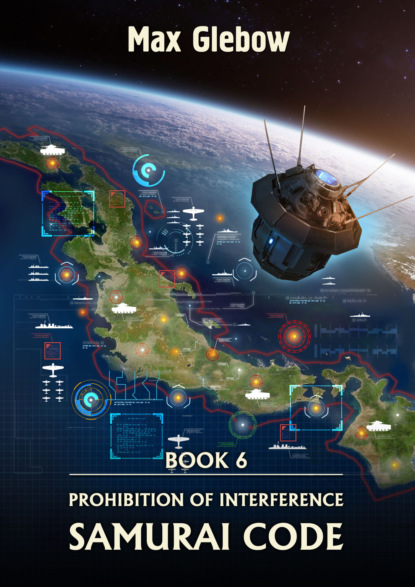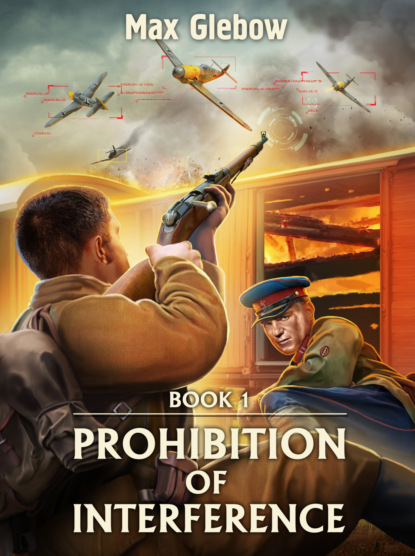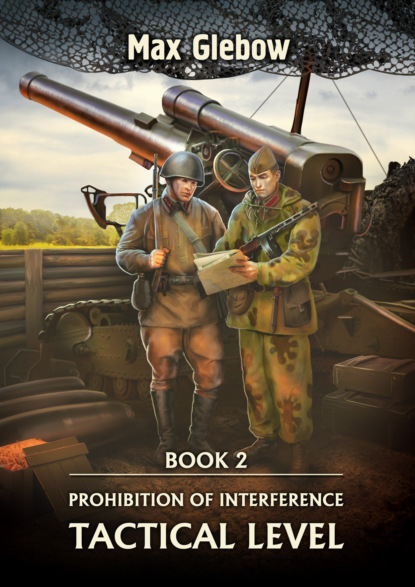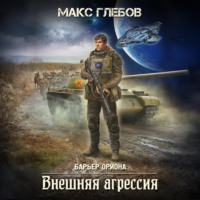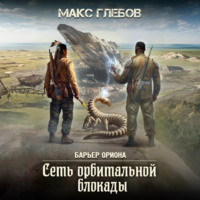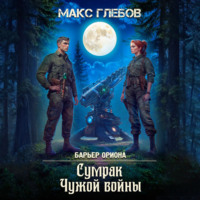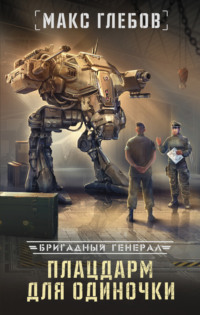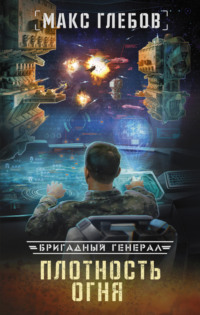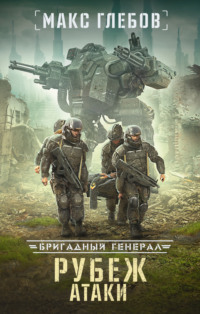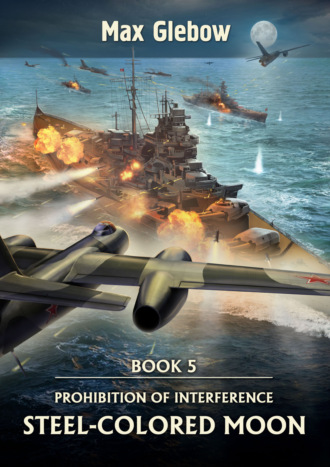
Полная версия
Prohibition of Interference. Book 5. Steel-colored Moon
Using the experience of Leningrad and the specialists who had already undergone the necessary practical training, I hoped to quickly enough organize in the Crimea a unified system of fire control of the major caliber of warships and guns of coastal batteries. The 305mm fuel-air shells were now also on their way to Novorossiysk by special train. Unfortunately, only 200 of them were produced in time, as production was focused mainly on 203 mm caliber, which was suitable for the B-4 howitzers. Nevertheless, I was really counting on this ammunition. The Kerch Peninsula was not so big, and the guns of the Sevastopol-class battleship could shoot through it, also they could reach as far into the Crimean territory as 30 kilometers from the coast and almost 40 kilometers from the towers of the coastal batteries of Sevastopol.
We flew over the Crimea, immersed in the darkness of night. Kudryavtsev was silent, trying not to distract me from my observations, he only occasionally adjusted the course in the control points. In the mountainous terrain not all details were clearly visible from the satellites, and sometimes I would order the Colonel to descend a little and fly over the areas I was interested in again. By and large we could have done without it, but since we flew for reconnaissance anyway, I wanted this flight to be of some real use, apart from eliminating unnecessary questions about how I knew so much about the location of enemy units and formations.
Manstein was not considered one of Hitler's best commanders for nothing. He was moving his troops and equipment purposefully, and every day his plan was becoming clearer to me. Previously the escape pod computer and my homemade analysis program only partly helped me in predicting the enemy's actions, but now Letra unfolded before me the Germans' plans in every detail. Drones were invisibly present at 11th Army headquarters, transmitting map shots, copies of orders, transcripts of telephone conversations and radio intercepts.
Taking advantage of their dominance in the air, the Germans conducted a thorough air reconnaissance. They knew almost everything about the group of Soviet troops opposing them. Manstein, who had received at his disposal Richthofen's 4th Air Fleet and had brought a considerable force of heavy artillery to Feodosiya, planned to squeeze everything possible out of the reconnaissance data in the initial phase of the operation.
In an effort to break deep into Crimea, Lieutenant-General Kozlov concentrated two-thirds of his forces on the northern section of the front, adjacent to the coast of the Sea of Azov. The southern section was occupied by a relatively weak force, covering Feodosiya and not taking active offensive actions. The command of the Crimean Front believed that the Germans would not risk an offensive along the Black Sea coast, fearing the heavy guns of the Black Sea Fleet ships, but Manstein reasoned otherwise. He decided to take advantage of the relative weakness of the southern section of the Soviet front and succeed by using the effect of surprise, based on the fact that the Russians were not expecting a strike in the south.
With only one panzer division at his disposal, the German commander decided not to break his tank fist into pieces, but rather to use a strategy that mirrored his plan to capture France in miniature – break through the Soviet defense in a weak area and turn north to hit the flank and rear of the stronger grouping of Soviet troops with tanks, intercepting its supply lines and smashing the rear. This plan was not bad and, frankly, it had every chance of success, so if I wanted to prevent the disaster that was looming over the Crimean front, I had to act without delay.
By the time I arrived at the front headquarters, Mekhlis had already been diligently addressing the command staff for several hours. Without meeting worthy resistance, the Army Commissar explained to Kozlov and his subordinates the essence and meaning of military duty, he censured them in every way for their indecision in the face of the enemy and their inability to inflict a crushing blow with all their available forces. Everything was clearly heading toward urgent preparations for a new offensive, and judging by the generals' faces, they had already resigned themselves to the inevitable.
Seeing me, Mekhlis could not contain his annoyance. My arrival seemed to have prevented him from making a fervent speech on a moral-political subject, to which he was about to move on from purely military matters. However, the Army Commissar had to introduce me to the front command and even yield the floor, as I had just returned from the reconnaissance raid with new data.
“Well, comrade commanders, I guess you understand my vision of the situation,” Mekhlis squinted slightly and looked around the assembled officers with a piercing look. “And now Major General Nagulin will explain to you in detail how and where you will attack and in what time frame you must break through the front and reach the steppe regions of Crimea.”
Mekhlis made an inviting gesture in my direction. At the same time, a faintly unkind grin slid across his face.
I went to the desk and pulled out of my briefcase a map with the current situation on the front, marked in advance. For a minute the generals silently digested the new information about the enemy, and their faces reflected a range of feelings, from doubt and mistrust to a grim understanding of what awaited them.
“There will be no offensive,” I said softly in the hanging silence. “The front immediately turns to defense, limiting itself to demonstrative actions imitating continued preparations for a strike in the north.”
“Comrade Nagulin!” Mekhlis's voice soared to high notes, “The Headquarters of the Supreme High Command and Comrade Stalin expect us to succeed decisively! We must mobilize all forces, identify those responsible for the failures of the last month, make the right personnel decisions, and immediately prepare a new offensive!”
“There will be no offensive, Comrade Army Commissar 1st Rank,” my voice was as calm as ever, but there were notes in it, that resembled the clanking of tank caterpillars. “The Germans know about our every move, they are aware of the locations of army and divisional headquarters, outnumber us in field artillery and have overwhelming air supremacy. We have two or three days before their counterattack. And the first thing they will do is an artillery and air strike on the headquarters and communication centers. All army commanders should immediately change the location of command posts and see to it that lower headquarters also execute this order as quickly as possible. You will continue to imitate activity in the previous places. I expect the main enemy strike on the southern flank between the Black Sea and the village of Koy Assan to cut off and block Feodosia and come to the rear of our troops at the Parpachian line. During the night the tank brigades should be withdrawn from the front lines, concentrated near the village of Arma-Eli, thoroughly camouflaged and prepared for a counterstrike on the places of the supposed enemy breakthrough. The Black Sea Fleet…”
“Your authority, Major General, is not given to you to encourage, or even to personally implant, defeatist sentiments on the front,” Mekhlis no longer shouted, but his hissing voice was heard by each of the commanders present at the meeting. “You will have to answer for these actions. I will immediately report your outrage to Comrade Stalin!”
Mekhlis turned around and headed for the exit. None of the generals uttered a word, and I only indicated a slight shrug of the shoulders and said as indifferently as possible:
“As you please, Comrade Army Commissar 1st Rank.”
Chapter 4
“Now, Erich, you and I are real state criminals,” said Richtengden softly as von Tresckow left the room, carefully placing the bundle handed to him in his briefcase.
“Wasn't it like that before?” Schliemann wondered.
“Before that there were words, but now the real thing has begun.”
“I don't think the Gestapo could see much difference,” grinned the Major.
“That's right,” Richtengden didn't argue.
“Von Tresckow turned out to be a valuable acquisition for us, don't you think?”
“Quite valuable,” the Colonel agreed, “and also enterprising, which is just as important. It would not have occurred to me to disguise our goods as liquor bottles.”
“You're just not a connoisseur of this drink,” Schliemann smiled.
“A week later Hitler flies to Poltava to the headquarters of Army Group South. If all goes well…”
“Heinrich, let's not get ahead of ourselves. For our part, we did everything we could. There are competent people in the second division of the Abwehr, so I'm not worried about the technical side. Everything now depends on von Tresckow's equanimity and his ability to convince his acquaintance in Hitler's entourage to bring a package for General Gersdorf on the plane.”
“He will convince. I haven't met such an eloquent man as von Tresckow in a long time. But you're right, let's not get ahead of ourselves; we don't have long to wait.”
* * *We didn't have time to complete our preparations. The German offensive was only days away, and the front's readiness for defense was still unsatisfactory. Lieutenant General Kozlov turned out to be quite a competent commander, but, like many other members of the Red Army high command, he lacked initiative, besides, he was completely incapable of arguing with his superiors. But he proved to be quite good as the executor of clear and unambiguous orders.
Letra pointed out to me the two main problems of the Crimean Front. First, the terrain allowed the Germans to use their air superiority effectively. The open steppes, crossed in some places by long, gentle hills, made it easier for enemy aviation to operate and prevented Soviet troops from taking cover from dive-bombers and attack planes.
Richthofen's pilots were considered the best specialists in the Luftwaffe in supporting the ground offensive, which was what Manstein needed now. The aviation of the Crimean Front and Kudryavtsev's separate air regiment could not be compared with the German 4th Air Fleet, which had 700 aircraft, in number and pilot training.
The dramatic jump in the effectiveness of German anti-tank weapons was the second problem. It seemed that the enemy had decided to concentrate all the innovations in this area right here, in Crimea. Not only the tanks of the 22nd Panzer Division, but also the assault artillery of infantry units received new long-barrel guns. Another dangerous German innovation was the anti-tank gun with a conical barrel. It would seem that its rather modest caliber of 28 millimeters should not have frightened the Soviet tank crews. However, the design of the gun and the tungsten-core projectile allowed this relatively light gun to penetrate armor up to 100 millimeters thick. And the final touch to this unsightly picture were the Henschel Hs 129 attack aircraft, designed to fight tanks, which had been sent to Manstein in considerable numbers before the offensive began.
Taken together, these anti-tank weapons drastically reduced the survivability of Soviet tanks in combat, and Red Army commanders had not yet realized the danger of this qualitative leap in the level of enemy anti-tank weapons; they were counting on the T-34 and KV's ability to relatively easily repel the intended attack.
Despite all the parallels I drew between the situation in Crimea and near Leningrad, there were significant differences. In Leningrad, in addition to the guns of the battleships Marat and October Revolution, I also had at my disposal the most powerful air defense system in the city, which consisted of many hundreds of anti-aircraft guns, searchlights, and balloons. Under the cover of these forces, warships could feel relatively safe and could fire their major caliber guns in relative peace.
Here the battleship Paris Commune had to operate from the open sea, and in case of enemy air raids it could rely only on its own air defense facilities and on the antiaircraft guns of the escort ships, which was fraught with great problems and a high risk of losing the Black Sea Fleet's only major battleship. Consequently, I could only use heavy ships at night, and this significantly reduced the ability to support ground troops with shipboard artillery.
Letra looked at the prospects of the Crimean front without any enthusiasm. I used the Moonbase computer at the limit of its design power, forcing it to analyze many thousands of scenarios, but if we set aside the unlikely options associated with fatal bad luck for the Germans and spectacular luck for the Red Army, the picture was bleak.
We were going to lose Feodosia in any event. Only the date of its fall varied, but in any case it had to happen no later than a week after the start of the German offensive. Even in the best-case scenarios, we would only have been able to delay the advance of the Germans to Kerch. We could have succeeded in stopping the enemy at least on the Isthmus of Parpachia in the very rare and rather exotic branches of the forecast, related to mistakes and miscalculations of the German command, which, of course, happened regularly, but it would be strange to count on them in the basic scenario.
In the end, I came to the conclusion that it made no sense to seek a solution by limiting myself to the means of the Crimean Front alone, and gave Letra a new assignment. Now I was looking at a map of the entire Soviet-German front. In the time remaining before the German strike, almost nothing could be changed, with one very important exception, and that exception was the planes.
The giant front, which drew an intricate line across the country from north to south, stood in unsteady equilibrium, somewhere mired in the mud, somewhere stabilized by the complete exhaustion of the parties, and somewhere, as in the Crimea, frozen for a while before exploding into a whirlwind of fire and steel. We clearly should not have expected significant events anytime soon everywhere, and I gave Letra the task of calculating how much and from what places it would be possible to take off air power without causing critical damage to the stability of the respective defense sites.
In the evening I used the authority of a representative of the Headquarters of the Supreme High Command to send a long telegram to Moscow, stating my view of the situation in the Crimea. Judging by the fact that Mekhlis did not touch me during the day, having gone to his moral and political affairs somewhere in the army headquarters, Stalin had not yet reacted in any way to his cries about my arbitrariness, and I could only guess what the Chief would do after receiving both our telegrams. The Supreme Commander trusted Mekhlis, if not unconditionally, then very much, but I had never failed to live up to his expectations. In any case, I had only to wait.
I haven't seen Lena in almost 24 hours. She went to Vice-Admiral Oktyabrsky in company with Lieutenant General Zashikhin. After learning what I needed people and equipment for, the commander of the Leningrad Air Defense Corps asked me a simple question:
“Comrade Major General, in the Crimea do you personally plan to organize a unified system of fire in the image and likeness of what was done in Leningrad?”
I thought for a few seconds, quickly figuring out what the Lieutenant General was getting at. Lena, of course, knew very well what had to be done, but her low rank would hardly have allowed her to negotiate properly with the Black Sea Fleet command.
“I planned to take part in this case only at the initial stage, and then counted on your people and Senior Lieutenant of State Security Nagulina.”
“Uh-huh,” Zashikhin nodded, “and they will rest on the first technical or organizational problem that requires someone at the top of the command staff to solve. I assure you, there will be a ton of these problems in setting up non-standard interactions between the Army and the Navy. You know it very well yourself – you've seen it before.”
“I think you're right, Gavriil Savelyevich,” I nodded, looking with interest at the Lieutenant General, who received a new rank for our joint operation.
“I need to fly with you,” Zashikhin stated categorically. “That's when we'll get things up and running quickly and without problems. And we should definitely take someone from Admiral Tributs' staff – it will be easier for the sailors to agree with each other. Will you be able to get the approval of the Headquarters of the Supreme High Command?”
* * *Stalin sat at his desk, sucking on the mouthpiece of an unlit pipe, and thoughtfully looked over the documents in front of him. On top of the other papers were two telegrams. One came early in the morning from Mekhlis, and another, signed by Nagulin, arrived late in the evening.
The proven communist Mekhlis, whose unquestionable loyalty and honesty aroused no doubts in the Chief's mind, behaved quite predictably. Stalin did not doubt for a second that he and Nagulin would not work together, but he believed that their competition and the mutual dislike that quickly arose would serve as additional incentives to solve the complex tangle of problems that the situation in the Crimea increasingly resembled.
Mekhlis branded the command of the Crimean Front with bad words, especially pointing to the complete inconsistency of Lieutenant General Kozlov and his Chief of Staff, Tolbukhin, to their positions. He claimed that they perceived trips to the troops as punishment, and led the front from afar, preferring to sit out most of the time on the other side of the Kerch Strait. He also demanded an urgent reinforcement of the front with infantry and tanks, since many equipment and personnel had been lost in the botched offensives undertaken by the Crimean Front in recent weeks. According to Mekhlis, Kozlov completely failed in his preparations for a decisive offensive, and he was in principle incapable of organizing it effectively.
He naturally criticized Nagulin as well. Mekhlis accused him of arbitrariness and total disregard for the task set by the Headquarters of the Supreme High Command, and, finally, of direct sabotage of offensive preparations, which was expressed in an order to the troops to switch to defense and limit themselves to imitation actions, aimed at misleading the enemy about the allegedly being prepared for an attack in the north of the peninsula.
Stalin frowned involuntarily. In the morning, immediately after reading the first telegram, this order of the young representative of the Headquarters of the Supreme High Command, unexpected and not coordinated with anyone, caused him indignation, which, apparently, Mekhlis hoped for. Nevertheless, the Commander-in-Chief remembered that the advisability of Nagulin's actions had been questioned more than once in a variety of situations, and almost always these doubts proved unfounded. Therefore, he preferred to wait a while and not make hasty decisions. In the end, this approach turned out to be correct.
Nagulin explained his position in detail in his telegram of the evening, and his arguments, at the very least, deserved careful consideration and raised a number of serious concerns.
The only thing in which Mekhlis and Nagulin did not contradict each other was the need for the urgent transfer of reinforcements to the Kerch Peninsula. Only the first of them asked for infantry and tanks, and the second for fighters. In principle, Nagulin probably would not have objected to ground troops either, but, in his opinion, the moment had already passed and there was simply no time left to get them into Crimea.
“Comrade Stalin, Marshals Shaposhnikov and Budyonny and Generals Zhukov and Zhigarev have arrived,” reported the Chief's personal aide, Poskrebyshev.
Stalin nodded silently, and left the table to meet the top military leaders of the USSR entering the cabinet. All four invitees had already seen copies of the telegrams from the Crimean Front, so Stalin did not have to bring them up to speed.
“Let's start with you, Boris Mikhailovich,” the Supreme Commander-in-Chief addressed the Chief of the General Staff as the visitors seated themselves at the long conference table. “Comrade Mekhlis's position is very clear to me and needs no comment. What do you think of the telegram from Major General Nagulin?”
“This is very unpleasant information, Joseph Vissarionovich,” replied Shaposhnikov after a short pause. “Frankly, if I had received such a telegram from Lieutenant General Kozlov, I would have suspected him of panic or inadequate assessment of enemy forces. As for Comrade Nagulin, I can say that I have never yet noticed him showing any signs of unreasonable panic, and if, after personally conducting air reconnaissance, he claims that we cannot avoid a heavy defeat without immediately reinforcing the front with air power, I would, at the very least, listen very carefully to this opinion.”
Stalin nodded to Shaposhnikov, showing that he took note of his words and turned his gaze to Budyonny.
“And what will the commander-in-chief of the North Caucasus tell us on this issue? The supply of the Crimean front with everything necessary and control of General Kozlov's actions are in your charge, Comrade Marshal. What do you think about what Mekhlis and Nagulin said about the state of affairs on the Kerch Peninsula?”
“Until recently there was no reason for such harsh assessments, Comrade Stalin,” Budyonny answered clearly. “However, much of my understanding of the situation in the Crimea was based on General Kozlov's reports, which in turn were based on front-line intelligence. I see no reason not to believe Comrade Mekhlis's assessment, especially since, according to my own impressions, Lieutenant General Kozlov is not showing his best side as a front commander.”
“Let's leave Comrade Kozlov alone for now,” Stalin winced slightly, “I understand your desire to have someone like Hindenburg in his place, but you can't help knowing that we have no Hindenburgs in reserve. In general your position is clear to me, although I had hoped to hear from you a more specific answer.”
Stalin put the pipe on the table and looked around at the assembled officers.
“Who else has something to say, comrades?”
Zhukov took the floor.
“In my opinion, Lev Zakharovich paints the devil blacker than he really is. I am not talking now about the situation in Crimea, but about the actions of Major General Nagulin. This man would not sound the alarm in vain. I saw how he acted near Leningrad. Any other commander in his position would have long ago cried out for reinforcements and reserves, but Nagulin solved the problem with the forces available, although even I had the feeling for a moment that he would not make it. When such a commander speaks of the urgent need to go on the defensive and demands that the air force be transferred to him immediately, I have an irresistible urge to give him twice as many planes as he asks for.”
“I totally agree,” Shaposhnikov supported Zhukov.
“ Is that so?” Stalin grinned, “This is a commendable unanimity, but I would like to remind you, comrades, that if we had the ability to immediately send twice as many tanks, planes, and artillery to each front commander or Headquarters of the Supreme High Command representative than he asks for, we would already be having tea in Berlin, or even on the shore of the English Channel.
Comrade Zhigarev, Major General Nagulin's telegram gives justification for the number of planes we can send him without critical damage to other sections of the front. The Headquarters of the Supreme High Command is interested in your opinion as to whether we can really remove and redeploy to the Crimea some of the fighters from these frontal air groups and not have irreparable consequences for ground troops as a result.”
Zhigarev didn't answer right away. The commander of the Red Army Air Forces gave everyone at the meeting an attentive look and said softly:
“Comrades, don't you think that Major General Nagulin, who recently received a high rank and was first sent by the Headquarters of the Supreme High Command to one of the fronts, knows too much about the size of our Air Force, its structure and distribution across fronts and armies? Honestly, judging by his telegram, he knows as much as I do.”
There was a pause. No one was in a hurry to respond to what the Air Force Commander had said.


